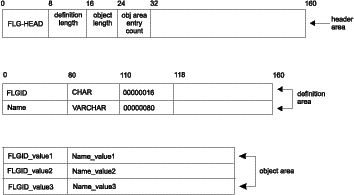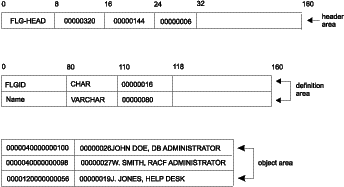
Retrieves a list of Contact objects for an Elemental or Grouping object.
Authorization
Administrator or user
Syntax
APIRET APIENTRY FLGListContacts( PSZ pszFLGID,
PFLGHEADERAREA * ppListStruct,
PFLGEXTCODE pExtCode );
Parameters
Characters 1-6 of this ID identify the object type of this instance.
Characters 7-16 of this ID are the system-generated unique instance identifier.
This output structure contains the 16-character FLGID of each Contact object and its 80-character name.
Entries in the list are first sorted by object type name, then by the value of the Name property for each instance, according to the collating sequence used by the database management system used by your information catalog.
The maximum number of Contact object instances that can be returned by FLGListContacts is approximately 5000, depending on the storage available on your machine.
See Appendix D, Information Catalog Manager reason codes for an explanation of the returned reason codes.
Output structure
FLGListContacts produces an output structure containing a list of Contacts, as shown in Figure 101.
The object area of the output structure contains a list of Contact object instances associated with the specified object instance. These Contact objects are identified by the value of the FLGID and the external name for each object instance.
Figure 101. FLGListContacts output structure

Usage
Freeing memory allocated for an output structure
If FLGListContacts returned data in the output structure, you must save the data returned in the output structure and then call FLGFreeMem (see FLGFreeMem). Do not use other methods, for example, C language instructions, to free memory.
Figure 102 shows the C language code required to invoke the FLGListContacts API call. This sample code retrieves a list of the Contacts for Elemental object MYREPORT.
Figure 102. Sample C language call to FLGListContacts
APIRET rc; // reason code from FLGListContacts
UCHAR pszFLGID[FLG_ID_LEN + 1];
PFLGHEADERarea * ppListStruct; // pointer to output structure pointer
FLGEXTCODE ExtCode=0; // extended code
.
. /* allocate storage for input parms */
. /* set objid to FLGID of 'MYREPORT' */
.
rc = FLGListContacts (pszFLGID,
ppListStruct, // address of output structure pointer
&ExtCode);
Figure 103 shows the output structure for this API call.
Figure 103. Sample output structure for FLGListContacts
